Digitalization of agricultural extension and advisory services (AEAS) is central to the development of farming communities. With digital AEAS, the potential for increased efficiency, inclusivity, and sustainability in the agricultural sector continues to grow.
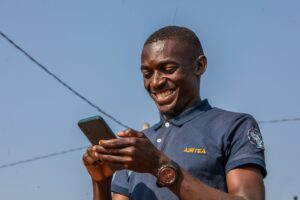
Kenneth Mwanja, one of the digital connectors from Bugiri District
The Uganda Forum for Agricultural Advisory Services (UFAAS) with support from the African Forum for Agricultural Advisory Services (AFAAS) is implementing the AIRTEA third-party project (AIRTEA_TP 009) dubbed Digital Connectors for Farming Communities (DC4FC), aimed at accelerating sustainable agricultural extension services in farming communities. In Uganda, this project involved the selection of nine young agripreneurs from two agricultural innovation hubs, equipping them with digital tools, and providing training, coaching, and mentorship to enable them establish viable and sustainable agricultural advisory services enterprises aimed at benefiting selected farming communities. The innovation hubs were Zirobwe Agaliawamu Agribusiness and Training Association (ZABTA) in Luweero, and Bugiri Agribusiness Institutional Development Association (BAIDA).
On February 5th, 2025, UFAAS held a capitalization event for the Digital Connectors project stakeholders to discuss the progress, challenges, and future prospects of the digitalization of AEAS. The event, which was held at Eureka Hotel in Ntinda, a Kampala suburb, brought together the digital connectors (DCs), the innovation platform leads, the host district technical leaders, policymakers, and farmers from the project implementation areas—Luwero and Bugiri districts.
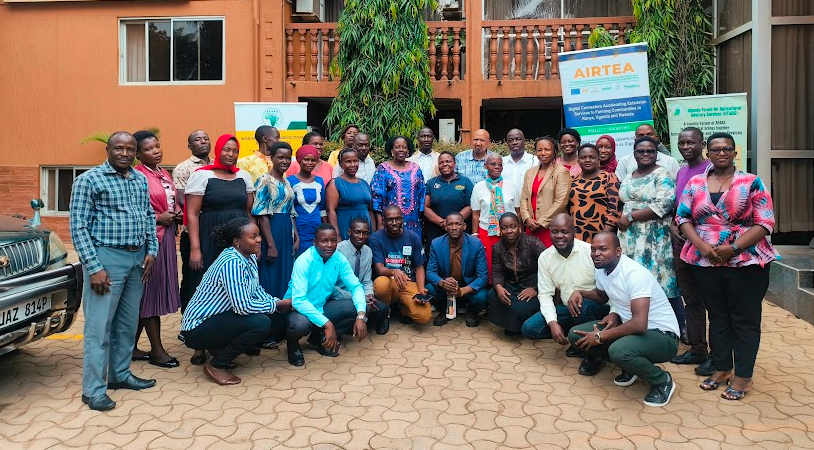
Stakeholders at the event
Leaders applaud the digital connectors initiative, call for documentation, collaboration, and business attitude
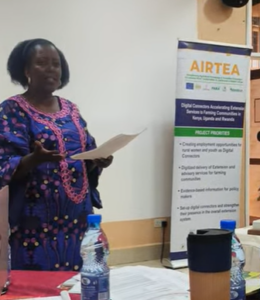
Ms Adeline Muheebwa, UFAAS Board Chairperson
In her opening remarks, Ms Adeline Muheebwa the Chairperson of the UFAAS Board applauded UFAAS and the digital connectors for the great work done in narrowing the extension-worker gap. She highlighted the digital penetration in not just agriculture but in day-to-day lives, stating that whoever is not willing to move with the trend is likely to be obsolete. Ms Muheebwa appealed to the digital connectors to always showcase their work to build evidence that digital extension works and can be a viable business venture. “You are doing great work, do not leave it in your gadgets and on the shelves. Scale it out […] you are catalysts for employment generation” she told the digital connectors. She thanked AFAAS for guiding and supporting UFAAS, and for the partnershipes scoped.
Officiating the workshop opening, Dr. Silim Mohammed Nahdy, the Executive Director of the African Forum for Agriculture Advisory Service (AFAAS), reiterated the messaging urging the digital connectors to scale further to ensure financial sustainability, stating that this was the whole concept of blended business models.
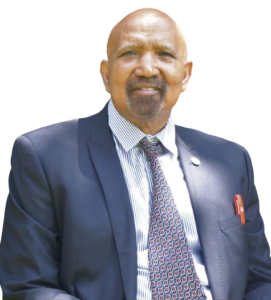
Dr Silim Nahdy, Executive Director, AFAAS
“We need to ensure innovations and enterprises started by the digital connectors bring in a revenue stream; this has been my call that youth have a role to play in advisory service delivery, but we need to emphasize the adoption of sustainable blended business models,” remarked Dr Nahdy.
Dr Nahdy also emphasized that digitalization is an objective of the African continent and a key performance indicator (KPI) for the agricultural sector. He stressed that knowledge is no longer confined to extension workers alone, citing that farmers also hold a wealth of experience, thus the need for co-creation of knowledge and sharing insights in innovation systems. Dr Nahdy also highlighted the potential of digital platforms in expanding knowledge exchange beyond local communities.
” When you digitalize agricultural knowledge and farmers’ experiences and innovations, you go beyond your locality and reach a wider audience. […] enhancing learning and adoption of best practices across regions,” remarked Dr Nahdy. He encouraged all stakeholders to document and share these experiences in various knowledge products and share widely to maximize their impact on agriculture.
Alignment of the Digital Connectors activities with the government’s strategic direction
Dr Patience Rwamigisa, Assistant Commissioner for Extension at Uganda’s Ministry of Agriculture, Animal Industry, and Fisheries (MAAIF), said that by leveraging mobile applications, online platforms, and digital advisory tools, the AIRTEA project initiative is moving away from traditional extension methods towards a more integrated, technology-driven approach. “This transformation enhances real-time information sharing, increasing both productivity and efficiency,” remarked Dr Rwamigisa.
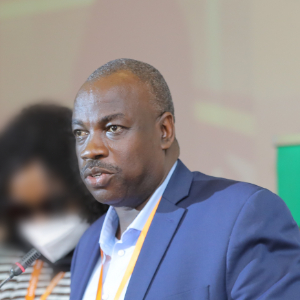
Dr Patience Rwamigisa, MAAIF
He reaffirmed that the AIRTEA Digital Connectors project aligns with the policy direction of the Ministry of Agriculture, Animal Industry, and Fisheries (MAAIF), especially the Ministry’s digitalization strategy which integrates multiple digital components to provide timely and efficient services to farmers. “This digital connectors project aligns well with the Ministry ‘s digitalization strategy components, which include the e-Knowledge Management System, e-Advisory System , e-Weather, e-Grievance Management System, e-Crisis Management, and e-Diary, said Dr Rwamigisa. He emphasized the need to consolidate efforts to support digital innovations that can penetrate rural areas and enhance agricultural production and productivity, subsequently improving farmers’ livelihoods.
Dr Rwamigisa also cautioned against the common issue of projects disappearing once funding ends, applauding the business model, and stressing the importance of learning from past experiences. In his concluding remarks, he told stakeholders that, in a strategic move, the ministry directed the department of agriculture extension to redefine its role by reviewing existing policies, and encouraged UFAAS and AFAAS to engage in these processes. He also acknowledged and appreciated AFAAS and partners for mobilizing resources for the Digital Connectors initiative, expressing anticipation for the project’s recommendations.
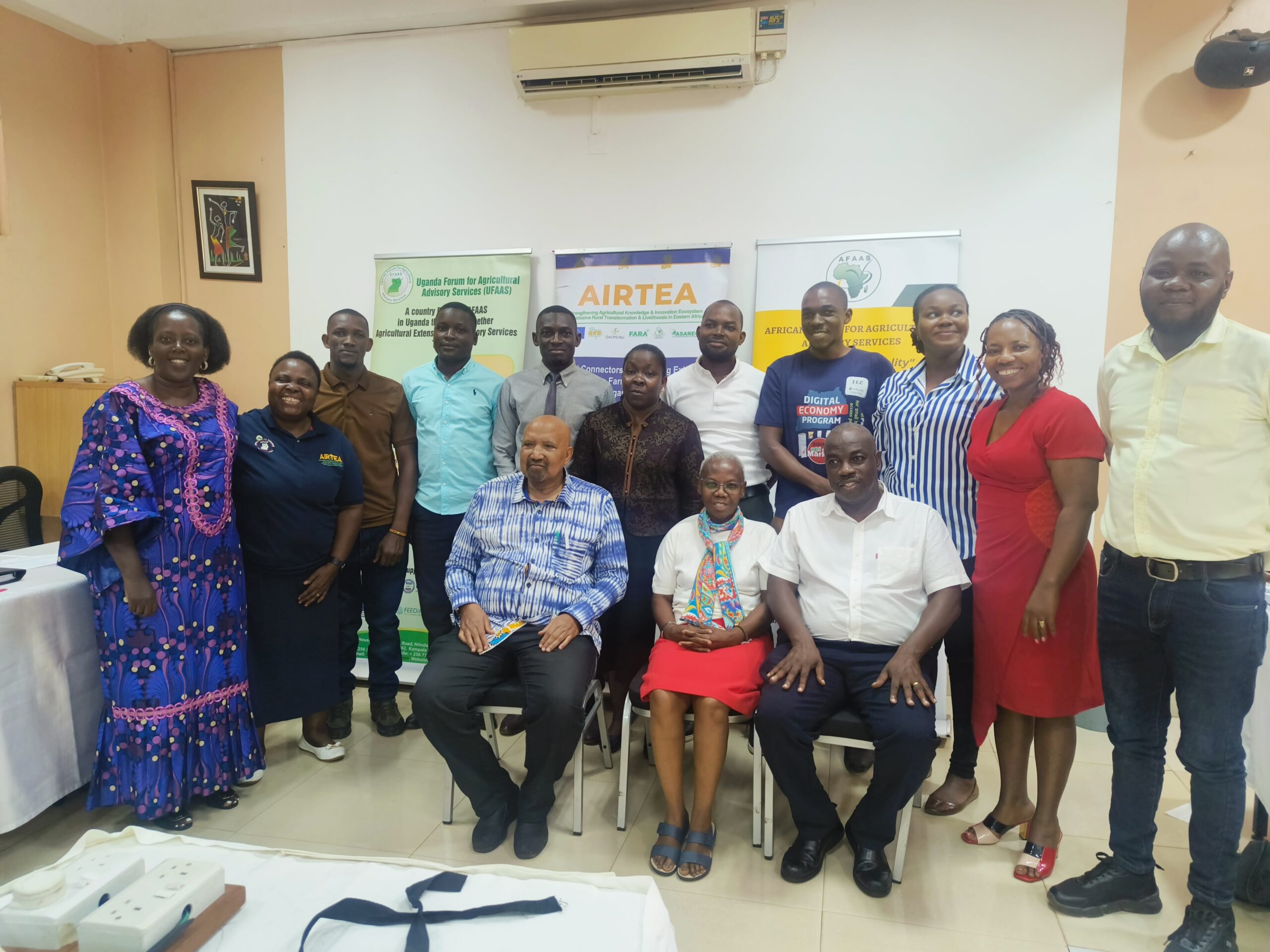
Digital Connectors with AFAAS, UFAAS , MAAIF and AgConnectors officials
Ms Beatrice Luzobe, the Chief Executive Officer at UFAAS, said that one of the key objectives of the Digital Connectors initiative was to create employment opportunities for rural youth and women. The project identified individuals engaged in agricultural service provision and equips them with digital tools to enhance their efficiency.
“These digital connectors serve as vital intermediaries between farmers and extension services, ensuring that even remote farming communities receive timely and relevant agricultural information, remarked Ms Luzobe.
Ms Luzobe added that the AIRTEA digital connectors reached over 2500 farmers in Bugiri and Luweero Districts, affirming that indeed digitalization helped to bridge the gap between extension workers and farmers.
Experiences from stakeholders in the agricultural innovation hubs:
During the event, the stakeholders also discussed the operations of the project and lessons learned over the last two and a half years. They affirmed mutual benefits and linkages among digital connectors, farmers, innovation platforms, and the district’s technical and leadership components. Facilitated by Dr Rosemirta Birungi from AgConnectors, one of the lead trainers on the project, she informed stakeholders that DCs underwent a comprehensive training using the business model canvas to ensure that their business models are revenue-based. He urged the DCs to make use of every opportunity available, reminding them that the current paradigm in extension, is about digitalization.
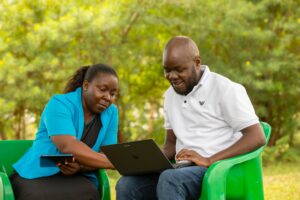
DCs Zalo Mutesi (L) and Nicholas Wabuyiwa (R)
The digital connectors appreciated the project indicating that it had been instrumental in thier lives. From creating decent employment for them to facilitating connections, making their work easy, building their capacity in business and management, to earning them respect in the farming communities, they expressed optimism that the activities would continue even after the project phases out. They expresed confidence in this citing that they were equipped with skills to sustain businesses while seeking revenue. “This work will continue. We have built a relationship with farming communities, and it is a win-win situation because all of us benefit. Farmers benefit from better yields, and we also earn money as commissions or sales of agricultural inputs,” said one of the digital connectors, representing his colleagues’ group work.
“Digital connectors help us with feedback from the farmers—they tell us which varieties are the best and what is happening in the communities. […] The people selected were also good ‘connectors’. These days. I can also draw on them to train farmers on other things. […] Even the extension workers in the District Local government are also shifting to digital because they have learned from these digital connectors that e-extension is efficient. […] Our District was even the best implementor of the Parish Development Model”, remarked an Agricultural Officer with Bugiri District Local Government.
Farmers alike appreciated the project, saying that digital connectors were very helpful in their farming operations, brought services closer to them, and introduced some new services they didn’t know, such as testing of soil. “We no longer have to travel long distances to get inputs. I just call the DC, and he sends me good fertilizer,” said one of the farmers.
The Digital Connectors received customized branded packs for their businesses as reminder souvenirs to continue and scale out their activities. Going forward, they indicated a plan to develop a dashboard to ensure compementality of their models in order to consolidate gains and enhance greater impact to farming communities.
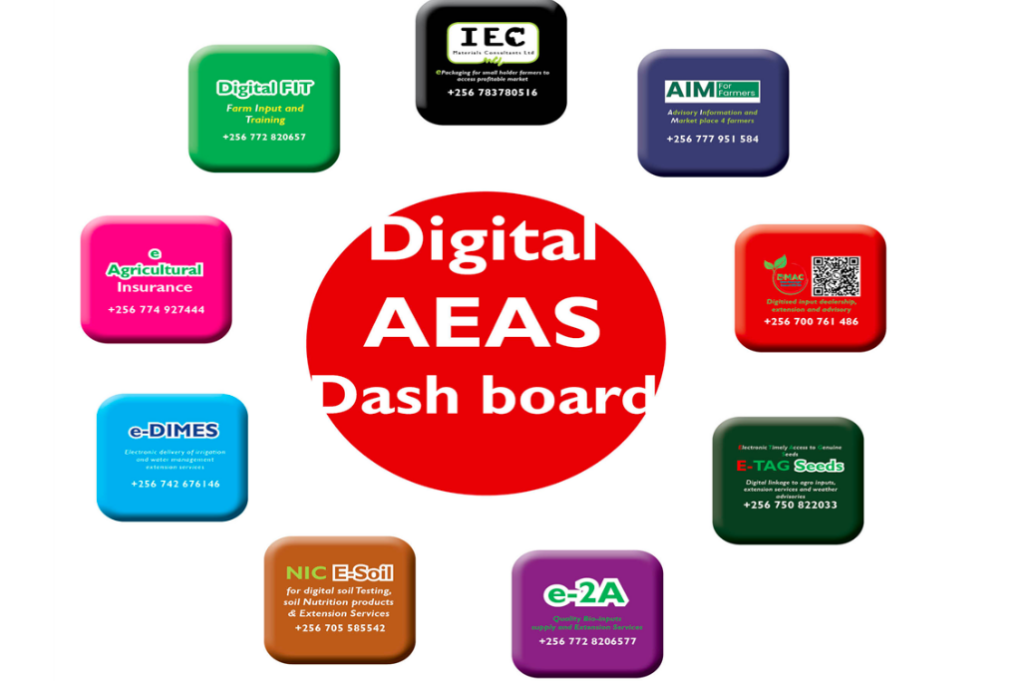
About the AIRTEA Digital Connectors for Farming Communities project:
The Digital Connectors for Farming Communities (DC4FC) project is a third-party project of the AIRTEA. AIRTEA is the acronym for the Strengthening Agricultural Knowledge and Ecosystem Innovation for Inclusive Rural Transformation in Eastern Africa (AIRTEA) project funded by the European Union (EU)—ACP Innovation Fund through the Office of the Organization of African Caribbean and Pacific States (OACPS). It is coordinated by the Forum for Agricultural Research in Africa (FARA), and implemented by the Association for Strengthening Agricultural Research in East and Central Africa (ASARECA), and the East African Farmers Federation (EAFF).
The DC4FC project, led by the African Forum for Agricultural Advisory Services (AFAAS) is implemented through their Country fora in Uganda, Kenya and Rwanda.
Article compiled by Elizabeth Asiimwe, Communications and Knowledge Manager at UFAAS. and Grace Musimami, Communications Consultant at AFAAS.
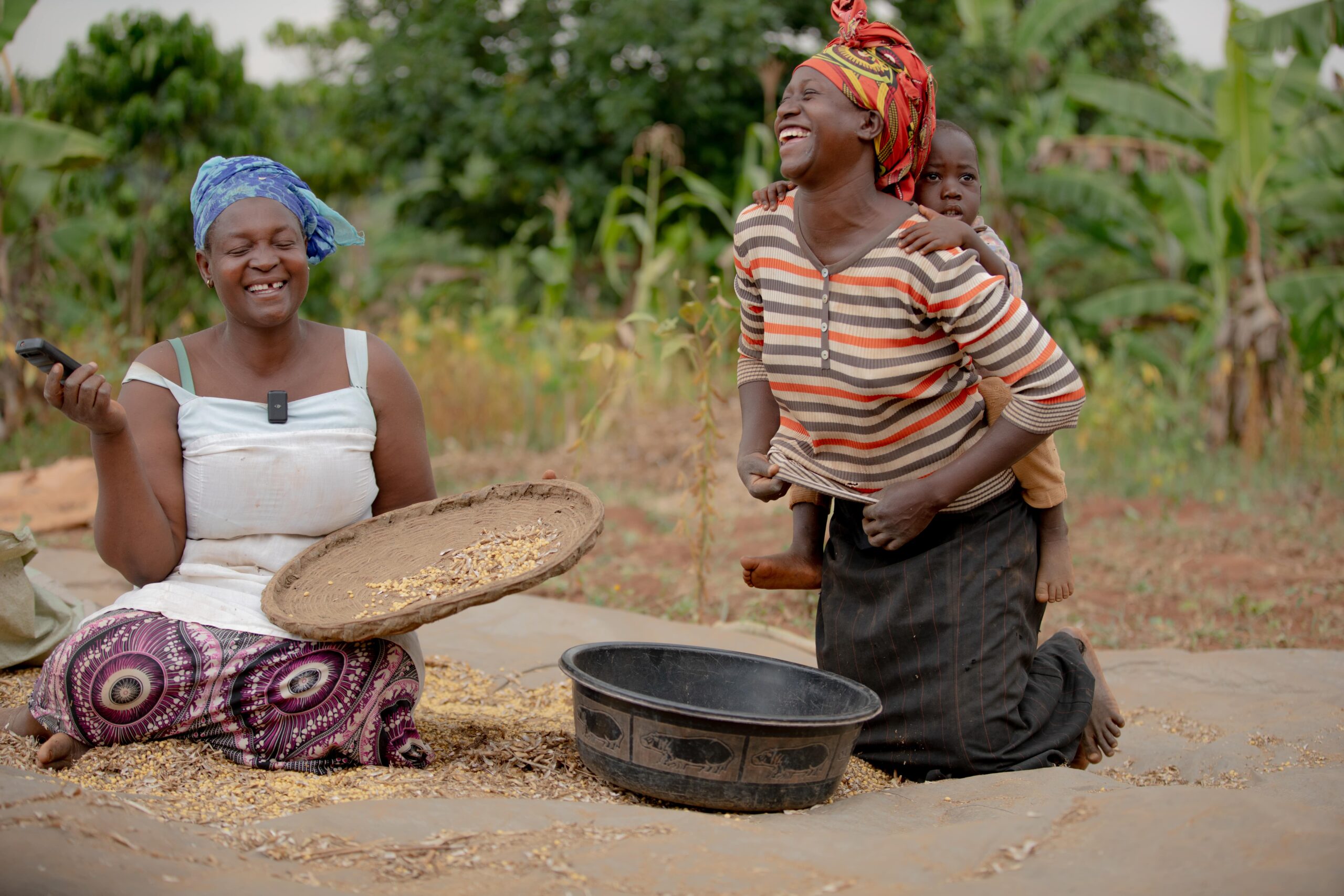
For more details, Contact
Beatrice Luzobe, Chief Executive Officer, UFAAS; Email: ufaas2013@gmail.com

